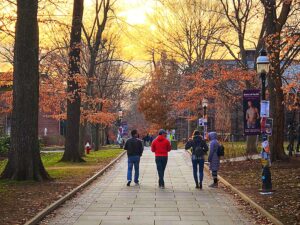Standardized tests have long been part of the college application process, and have caused students to stress for that entire duration. While test-optional admissions have recently risen in popularity due to the Coronavirus pandemic, most students still take standardized tests, and the scores they get still impact their college admissions chances.
There are, however, two different standardized tests offered, the ACT and the SAT. This leads many students to question which test they should take. In this article, we’ll explore the differences between the tests, and give advice on how you can determine which of them is right for you. Let’s jump in!
What are Your Options?
The first thing to ascertain, before researching the tests in-depth, is which of the two tests are available for you to take. While both the ACT and SAT have a national reach, different regions and school districts often favor one or the other, and sometimes getting access to both tests is not feasible.
Generally, the SAT is more popular on the coasts, while the ACT is more popular in the midwest. This New York Times graphic is a bit dated, but the trend has remained the same. Increasingly, however, students have the option to take both tests. Your school district may be the arbiter of this, however, and you should check with your high school counselor to find out what your specific options are.
If only one of the tests is easily accessible for you, then you should focus your efforts on preparing for that test.
Key Differences Between the ACT and SAT
The first thing to point out is that neither test is inherently easier, and neither is favored by colleges. Performing well on either test is seen as a sign of academic preparation, and will help your application. That said, due to structural differences between the tests, some students may perform better on one or the other.
The SAT
The SAT has three sections: reading, writing and language, and math. The math section is broken into two parts, however, one which allows a calculator, and one which does not.
The test as a whole lasts three hours and contains 154 questions. Generally, students who are better at math do better on the SAT, as the math section of the test is longer and more involved. Questions are generally arranged from easiest to most difficult, so the further you progress through a section, the more difficult the questions become.
The ACT
The ACT has four sections (plus the essay): reading, English, math, and science. The test lasts just under three hours and has 215 questions total. If you complete the essay as well, that adds 40 minutes to the testing time.
Students who are better at English generally perform better on the ACT. The science section is less on memorizing specific pieces of information, and more on the interpretation of data, but covers concepts the SAT does not. There is no correlation between the location of a question within the test and its difficulty.
What This Means for You
When students come to us for help preparing for the tests, we begin by having them take a full, timed, practice test for both the SAT and the ACT. Due to differences in format, students usually find one easier than the other. Using this information, we can then spend our time helping students prepare to take the test they are most likely to perform well on.
We recommend you do this, even if you are not working with a test prep company to help you prepare. When taking a practice test, try to mimic actual testing conditions as closely as you can. Find a quiet place, free of distractions. Set a timer for yourself, and don’t take breaks other than those offered during the actual test. Don’t use any materials other than those the test accepts.
By fully mimicking the conditions of the actual test, you are more accurately able to see how well you are able to perform on each. The time constraints are a key part of the differences between the tests, and the ability to work quickly and accurately is one of the things the tests are assessing.
The ACT is slightly shorter, and asks significantly more questions, leaving you with less time to answer each. While the SAT asks fewer questions, they often expect more work to be done in answering each, especially on the math section.
Since neither test is inherently easier or preferred by colleges, your only consideration when deciding which to take should be how well you score on each. Once you have determined this, you should devote all your time to preparing for that test, as there are differences in the material the tests cover, and in how you should prepare. If you want to learn how we help students prepare for the tests, read our article on the secrets of test prep. If you would like our help preparing to take these tests, consider signing up for one of our test prep boot camps.

The Essay Section
The ACT has an optional essay section. While the SAT used to have an essay component as well, they removed it in 2021. Some colleges still require you to complete the essay, though this is becoming less common, and it is likely they will phase out the essay entirely at some point.
It is up to you whether or not you complete the essay section of the ACT. If you already know which colleges you intend to apply to, we suggest checking whether or not they require the essay section. In general, however, we recommend students complete the essay, so as to keep their college application options more open going forward.
Test-Optional Admissions
Due to the Coronavirus pandemic, many colleges have gone test-optional for admissions, at least temporarily. This causes many students to wonder if they need to take standardized tests at all. We recommend all students take standardized tests if possible, especially now.
The primary reason for this is there is no certainty in how long test-optional admissions will continue, and no standardization between colleges as to whether or not they accept test-optional admissions. While some schools are exploring the possibility of making test-optional admissions permanent, many others are not. Thus, you cannot count on having standardized tests be optional when you apply.
The other reason, and the main reason we encourage all our students to take these tests, is that having test scores when applying to a test-optional school can only help you. If your scores are at or above the school’s average, then you should submit them; if your scores are below average, you can ask that the school not consider them.
It is likely many universities will embrace a test-optional approach, as it allows them to artificially inflate their score averages for admitted students, as they only get scores from students who score exceptionally. As average test scores are one of the factors considered when calculating college rankings, universities understandably want their average test scores as high as possible.
Some colleges have gone test blind, meaning that they don’t consider test scores at all in admissions. This includes the entire University of California system. This is, however, still very much the minority of schools, so we still recommend all students take these tests.
Final Thoughts
Nobody likes preparing for tests, but they are an integral part of the college admissions process. We hope that this article has helped you decide whether the SAT or ACT is right for you, and how you can best decide which test to take. While you may not enjoy studying for the tests, scoring well can greatly boost your chances for college acceptance, or for earning scholarships.
If you want help on your test prep journey, or aren’t sure how to get started, check out Ivy Scholars’ test prep services. We offer both individual advising, and test prep boot camps. No matter where you are on your test prep journey, our methods can help you maximize your scores, and ensure you live up to your full potential. Reach out today to learn how we can help you.








